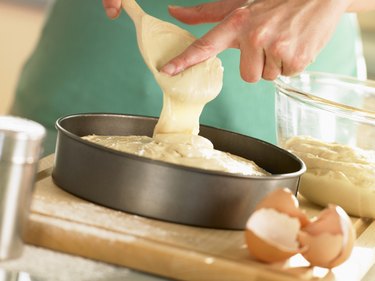
Cake mixes are a convenient alternative to baking from scratch, particularly if homemade baking isn't your forte. Most boxed mixes call for two to three extra ingredients including water, eggs and vegetable oil, which serves to bind all the ingredients together, adding extra moisture for the perfect cake.
You can swap in other oil and non-oil alternatives in place of vegetable oil and still create a tasty, rich cake. Some substitutions, like applesauce, have additional benefits, lowering the calories and sugar in your cake.
Video of the Day
Video of the Day
Substituting With Other Oils
If you've already started to bake your cake only to realize you don't have any vegetable oil on hand, not to worry. You can easily substitute these other oils for vegetable oils in cake mix:
- Canola oil. Canola oil is a type of vegetable oil often used for baking because it has a neutral taste and light texture. It can also be heated to high temperatures.
- Olive oil. Linked to lower LDL (or "bad") cholesterol and a reduced risk of heart disease, according to Harvard Health Publishing, olive oil can be used as an alternative to vegetable oil in cake mix, too.
- Coconut oil. Yes, you can use coconut oil in your cake mix, but keep in mind it's high in saturated fat, according to the Mayo Clinic.
- Avocado oil. Avocado oil is also high in monounsaturated, healthy fats, which are linked to a lower risk of heart disease, according to the American Heart Association (AHA).
How Much to Use
Substitute canola, olive or avocado oil for vegetable oil in equal measure. You can also swap coconut oil one-for-one, but make sure to measure it in melted, liquid form.
Non-Oil Substitutes for Vegetable Oil
You can make your cake recipes even more nutritious by using substitutes for oil that don't contain any fat, like veggie and fruit purees, according to the AHA. Dairy products like yogurt and butter also work well when you don't have vegetable oil in the house.
Fruit and Veggie Purees
Purees made from produce add moisture to the cake to prevent it from drying out or crumbling apart.
There are a number of different fruit and veggie purees you can use in cakes, keeping in mind that the stronger the flavor, the more you will be able to taste it in the finished product. Applesauce is a popular one, but you can also use pureed banana, pumpkin and sweet potato in baking recipes.
Deliciously moist, applesauce has far fewer calories than oil. Applesauce also adds no fat calories. Considering the apple's natural sweetness, you can even use less sugar in the cake if your recipe calls for sugar.
How Much to Use
Substitute 3/4 to 1 cup of fruit puree and 3/4 of a cup of veggie puree for every 1 cup of vegetable oil called for in the recipe.
Yogurt
You can also substitute yogurt for vegetable oil in baking recipes. Yogurt adds a creamy, thick texture to your cake.
Yogurt is rich in calcium, protein and B vitamins, according to the Harvard School of Public Health. Yogurt can also make your baked goods more filling because of the protein content.
How Much to Use
For yogurt, use 3/4 cup of yogurt per 1 cup of vegetable oil.
Butter
If you have butter on hand, you can substitute it for vegetable oil when preparing your cake mix. Melt the butter prior to mixing it with other ingredients to avoid clumping and ensure smooth, even distribution and texture. Butter makes for a slightly denser cake due to its richness, and it's ideal for stacked, layered cakes.
How Much to Use
Use an equal amount of melted butter as you would vegetable oil.
- American Heart Association: "Cooking to Lower Cholesterol"
- Harvard Health Publishing: "Is extra-virgin olive oil extra healthy?"
- American Heart Association: "Healthy Cooking Oil"
- Mayo Clinic: "Coconut oil for weight loss: Does it work?"
- American Heart Association: "Monounsaturated Fat"
- Harvard School of Public Health: "Yogurt"
- PLOS: "Is Butter Back? A Systematic Review and Meta-Analysis of Butter Consumption and Risk of Cardiovascular Disease, Diabetes, and Total Mortality."
Was this article helpful?
150 Characters Max
0/150
Thank you for sharing!
Thank you for your feedback!